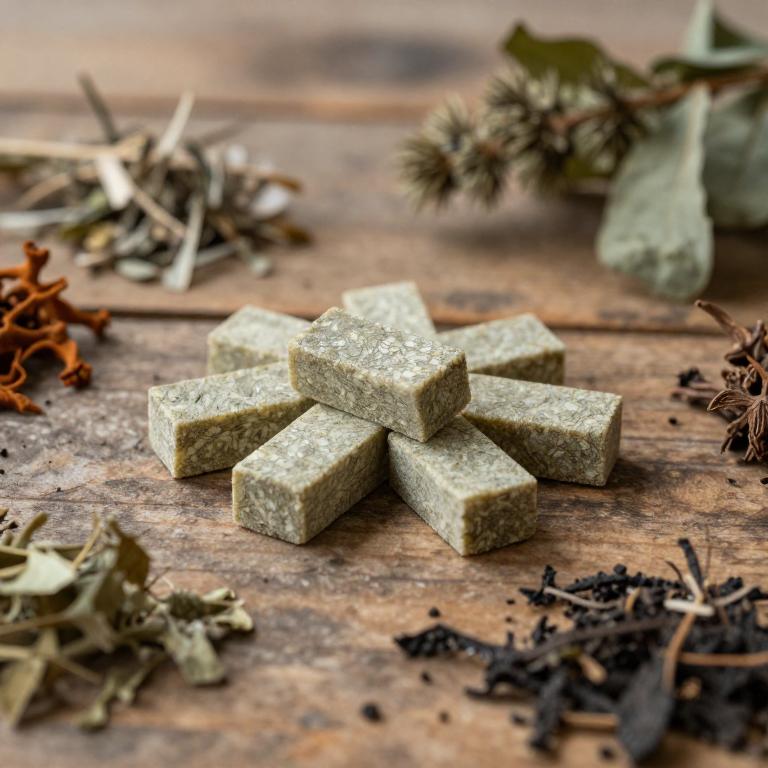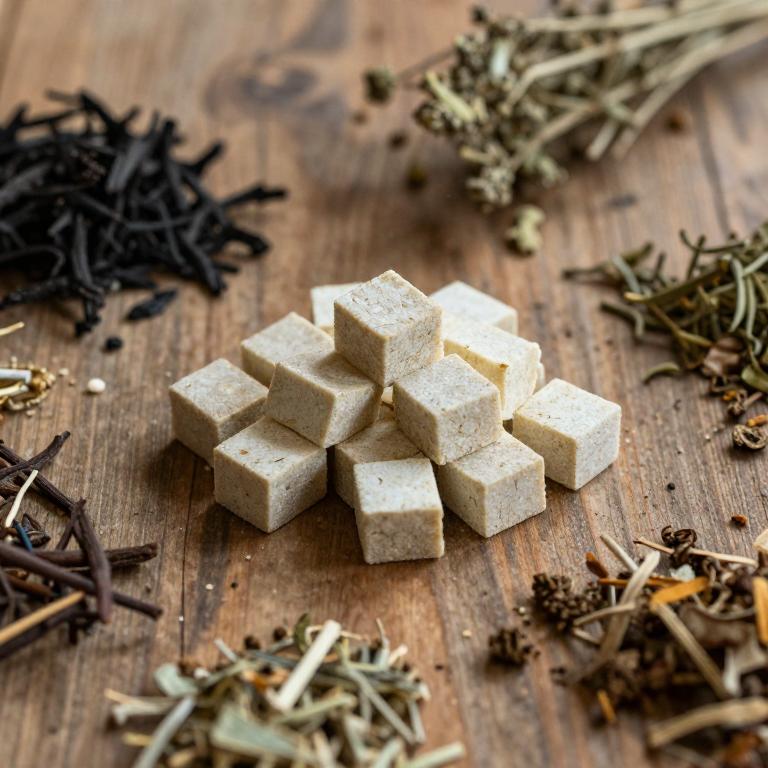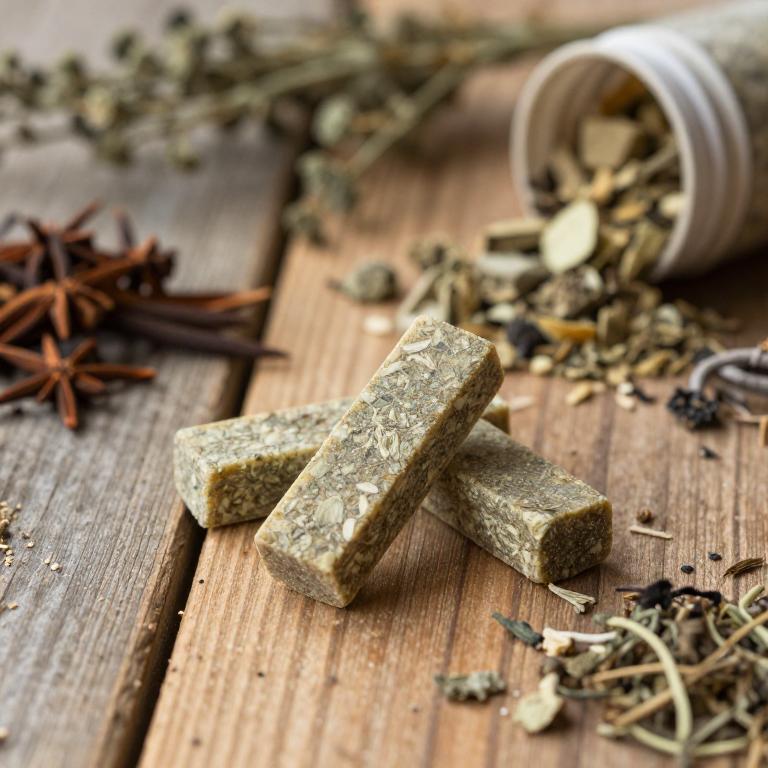10 Best Herbal Lozenges For Phlegm

Herbal lozenges for phlegm are natural remedies designed to help alleviate symptoms of excessive mucus production and congestion.
These lozenges typically contain ingredients like eucalyptus, thyme, ginger, and licorice root, which have anti-inflammatory and expectorant properties. They work by soothing the throat and promoting the expulsion of phlegm, making them a popular choice for those seeking relief without harsh chemicals. Many people find them effective for mild to moderate coughs and respiratory discomfort.
However, it's important to consult a healthcare professional if symptoms persist or worsen, as they may indicate a more serious underlying condition.
Table of Contents
- 1. Eucalyptus (Eucalyptus globulus)
- 2. Thyme (Thymus vulgaris)
- 3. Ginger (Zingiber officinale)
- 4. Peppermint (Mentha piperita)
- 5. Fennel (Foeniculum vulgare)
- 6. Licorice (Glycyrrhiza glabra)
- 7. Rosemary (Rosmarinus officinalis)
- 8. Scots pine (Pinus sylvestris)
- 9. Ceylon cinnamon (Cinnamomum zeylanicum)
- 10. Black pepper (Piper nigrum)
1. Eucalyptus (Eucalyptus globulus)

Eucalyptus globulus, commonly known as eucalyptus oil, is a popular natural ingredient used in herbal lozenges for its decongestant and expectorant properties.
These lozenges are designed to help alleviate symptoms of excess phlegm by promoting the clearance of mucus from the respiratory tract. The active compounds in eucalyptus globulus, such as cineole, have antimicrobial and anti-inflammatory effects that may reduce throat irritation and congestion. They are often used as a gentle, non-prescription remedy for mild respiratory conditions like colds and bronchitis.
When used as directed, eucalyptus globulus herbal lozenges can provide soothing relief and support natural healing processes in the respiratory system.
2. Thyme (Thymus vulgaris)

Thymus vulgaris herbal lozenges, derived from the common thyme plant, are traditionally used to support respiratory health and alleviate symptoms associated with excess phlegm.
These lozenges contain thymol, a potent antioxidant and antiseptic compound known for its ability to reduce mucus production and soothe throat irritation. The natural herbal formulation is often preferred by individuals seeking alternative or complementary treatments for coughs and congestion. Thymus vulgaris lozenges are typically safe for most adults and can be used as part of a holistic approach to managing respiratory discomfort.
However, it is advisable to consult a healthcare professional before use, especially for those with allergies or chronic respiratory conditions.
3. Ginger (Zingiber officinale)

Zingiber officinale, commonly known as ginger, is often used in herbal lozenges to help alleviate symptoms associated with phlegm and respiratory discomfort.
These lozenges work by leveraging ginger's natural anti-inflammatory and expectorant properties, which can help loosen mucus and ease its removal from the airways. The warming effect of ginger also soothes irritated throats and reduces the sensation of congestion. As a natural alternative to conventional medications, ginger lozenges are popular for their mild side effect profile and pleasant taste.
Regular use of these lozenges may support clearer breathing and provide relief for individuals suffering from excess phlegm or coughing.
4. Peppermint (Mentha piperita)

Mentha piperita, commonly known as peppermint, is often used in herbal lozenges to help alleviate symptoms associated with excessive phlegm.
These lozenges work by stimulating the mucous membranes in the throat, which can help to loosen and expel mucus more effectively. The cooling and soothing properties of peppermint provide relief from throat irritation and congestion. They are particularly beneficial for individuals experiencing coughs accompanied by thick, sticky phlegm.
As a natural alternative to over-the-counter medications, peppermint lozenges offer a mild, pleasant flavor while supporting respiratory comfort.
5. Fennel (Foeniculum vulgare)

Foeniculum vulgare, commonly known as fennel, is a herbal remedy often used in the form of lozenges to help alleviate symptoms associated with phlegm.
These lozenges are typically made from the dried seeds of the fennel plant and are valued for their expectorant properties, which help loosen mucus and make it easier to expel from the respiratory tract. Fennel lozenges may also provide a soothing effect on the throat, reducing irritation and discomfort caused by excessive phlegm. The essential oils in fennel, such as anethol, are believed to have antimicrobial and anti-inflammatory benefits that support respiratory health.
While generally considered safe, it is advisable to consult a healthcare professional before using fennel lozenges, especially for individuals with allergies or existing medical conditions.
6. Licorice (Glycyrrhiza glabra)

Glycyrrhiza glabra, commonly known as licorice root, is widely used in herbal medicine for its expectorant properties, making it a popular ingredient in lozenges designed to alleviate phlegm-related symptoms.
These lozenges work by stimulating the secretion of mucus, helping to loosen and expel phlegm from the respiratory tract. The active compounds in licorice root, such as glycyrrhizin and flavonoids, possess anti-inflammatory and antimicrobial effects that can reduce throat irritation and combat respiratory infections. However, prolonged use of licorice-containing lozenges may lead to side effects like hypertension due to the compound glycyrrhizin's impact on the body's sodium and potassium balance.
As a result, it is recommended to use these lozenges under the guidance of a healthcare professional, especially for individuals with pre-existing health conditions.
7. Rosemary (Rosmarinus officinalis)

Rosmarinus officinalis, commonly known as rosemary, is a medicinal herb often used in the formulation of herbal lozenges designed to help alleviate symptoms associated with phlegm.
These lozenges are typically made by combining rosemary extract with other natural ingredients such as thyme, eucalyptus, and honey, which are known for their expectorant and antimicrobial properties. The aromatic compounds in rosemary may help to soothe the throat and promote easier breathing by reducing mucus buildup. Regular use of these lozenges can provide relief from coughing and congestion caused by excess phlegm.
As a natural alternative to conventional medications, rosemary herbal lozenges offer a gentle and potentially effective remedy for respiratory discomfort.
8. Scots pine (Pinus sylvestris)

Pinus sylvestris, also known as Scots pine, has been traditionally used in herbal medicine for its respiratory benefits, and its extract is now commonly found in herbal lozenges designed to help alleviate symptoms of excess phlegm.
These lozenges are formulated to soothe throat irritation and reduce mucus production, making them a natural alternative for those suffering from congestion or coughs. The active compounds in Pinus sylvestris, such as terpenes and flavonoids, are believed to have antimicrobial and anti-inflammatory properties that support respiratory health. When used regularly, these lozenges may help ease breathing and promote clearer airways.
They are particularly suitable for individuals seeking a gentle, plant-based remedy for mild to moderate phlegm-related discomfort.
9. Ceylon cinnamon (Cinnamomum zeylanicum)

Cinnamomum zeylanicum, commonly known as cinnamon, is traditionally used in herbal remedies for its warming and expectorant properties.
Cinnamon herbal lozenges are formulated to help alleviate symptoms of phlegm by promoting the expulsion of mucus from the respiratory tract. These lozenges work by stimulating the mucous membranes and improving the flow of secretions, making them beneficial for individuals suffering from colds or respiratory infections. The aromatic compounds in cinnamon also have antimicrobial effects, which can help reduce the risk of secondary infections.
When used as part of a holistic approach, cinnamon lozenges may offer a natural and soothing remedy for managing excess phlegm and supporting respiratory health.
10. Black pepper (Piper nigrum)

Piper nigrum, commonly known as black pepper, is often used in herbal lozenges to help alleviate symptoms associated with phlegm and respiratory congestion.
These lozenges work by leveraging the active compound piperine, which has mild expectorant properties that may help loosen and expel mucus from the airways. The warming and stimulating effects of black pepper can also soothe irritated throat tissues and reduce the sensation of throat congestion. While not a substitute for medical treatment, these herbal lozenges may offer natural relief for mild phlegm-related discomfort.
However, individuals with allergies or certain health conditions should consult a healthcare provider before using them.